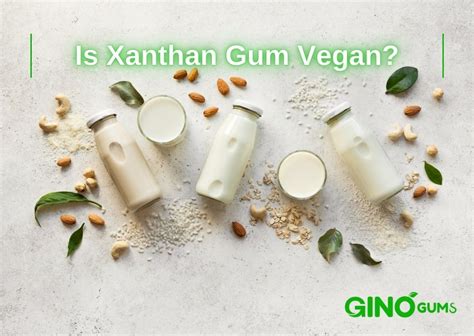The world of food additives can be a complex and confusing place, especially for those following a vegan lifestyle. One common ingredient that often raises questions is xanthan gum. Is xanthan gum vegan? In this article, we will delve into the truth behind xanthan gum and explore its vegan status in 5 key points.

What is Xanthan Gum?
Before we dive into the vegan status of xanthan gum, let's first understand what it is. Xanthan gum is a naturally occurring polysaccharide (complex carbohydrate) extracted from the bacterium Xanthomonas campestris. It is commonly used as a food additive and thickening agent in a wide range of products, from sauces and dressings to ice cream and beverages.
Point 1: Xanthan Gum is Derived from Bacteria
Xanthan gum is produced through a process of bacterial fermentation. The bacterium Xanthomonas campestris is fed a sugary substrate, such as corn syrup or sugarcane, which it breaks down into a complex carbohydrate. This carbohydrate is then harvested, purified, and converted into a powder or liquid form. Since xanthan gum is derived from bacteria, it is inherently vegan.
Point 2: No Animal Products are Used in the Production Process
The production process of xanthan gum does not involve the use of any animal products. The bacteria are fed a plant-based substrate, and the entire process is free from animal-derived ingredients. This makes xanthan gum a suitable ingredient for vegan products.
Point 3: Xanthan Gum is a Common Ingredient in Vegan Products
Many vegan products, such as plant-based milks, vegan yogurt, and vegan ice cream, use xanthan gum as a thickening agent. It is also used in some vegan sauces and dressings. This widespread use of xanthan gum in vegan products is a testament to its vegan status.
Point 4: Some Xanthan Gum Products May be Processed Using Animal-Derived Products
While xanthan gum itself is vegan, some products that contain xanthan gum may be processed using animal-derived products. For example, some manufacturers may use gelatin or other animal-derived products to filter or clarify xanthan gum. However, this is not a reflection on the vegan status of xanthan gum itself, but rather a concern with the production process.
Point 5: Always Check the Ingredients and Certification
As with any food ingredient, it's essential to check the ingredients and certification of xanthan gum products. Look for certifications like the Vegan Society logo or PETA's "Cruelty-Free" logo, which ensure that the product meets vegan standards. Additionally, always read the ingredient label to ensure that no animal-derived products are used in the production process.
In conclusion, xanthan gum is a vegan ingredient derived from bacteria and produced through a plant-based process. While some products that contain xanthan gum may be processed using animal-derived products, this does not affect the vegan status of xanthan gum itself. Always check the ingredients and certification to ensure that the product meets your vegan standards.





Gallery of Vegan Xanthan Gum Products





Is xanthan gum safe for consumption?
+Xanthan gum is generally recognized as safe (GRAS) for consumption by regulatory agencies around the world. However, some individuals may experience gastrointestinal side effects, such as bloating or gas, due to its high fiber content.
Can xanthan gum be used in gluten-free products?
+Yes, xanthan gum can be used in gluten-free products. It is a popular thickening agent in gluten-free baked goods, sauces, and dressings.
Is xanthan gum suitable for kosher or halal diets?
+Xanthan gum is generally considered suitable for kosher and halal diets, as it is derived from bacterial fermentation and does not contain any animal-derived ingredients.
We hope this article has helped you understand the vegan status of xanthan gum. Remember to always check the ingredients and certification of xanthan gum products to ensure that they meet your vegan standards.
